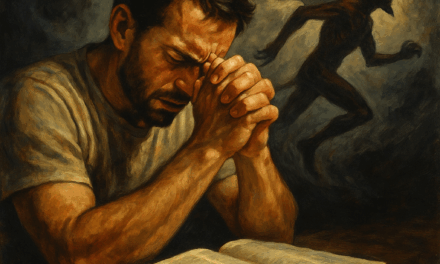Well, there are a couple of firsts surrounding this post. I had never ‘prescreened’ a movie before. I have never written an official movie review before. That’s all changed now, thanks to the new movie set to release on March 23, 2018 Paul, Apostle of Christ. I have tried my absolute best to not give away any spoilers, and most of the things I mention you will already know because of the Bible, or you will have picked up watching the trailers…but read at your own risk.

Take yourself back nearly 2,000 years ago to the ancient city of Rome. It’s A.D. 67, and Emperor Nero has found a scapegoat to blame for the terrible fires that have ravaged the Empire’s capital. The followers of a newfound religion known as Christianity are being rounded up and imprisoned, thrown to wild beasts in front of large crowds, and even set on fire to light the city at night. These are terrible times for Believers in Jesus. Nero has also caught one of the leaders of this fledgling Christian movement, the Apostle Paul, and has sentenced him to die by beheading, but as Paul awaits his imminent death, he has a visitor.
Luke has traveled to Rome and worked with Aquila and Priscilla to bribe a guard and secure a way into the prison to meet with Paul. Things are in such chaos that Luke needs Paul’s wisdom on how the church in the city should respond to the persecution. While there, he ends up writing the book of Acts. The church, Aquila, Priscilla, Paul, and Luke are all directly challenged on how to respond in the face of such overwhelming hatred by the Romans. Each has to make certain crucial decisions on the best way to share Christ’s love in the midst of these turbulent times as they “struggle against a determined emperor and the frailties of the human spirit in order to live out the Gospel of Jesus Christ and spread their message to the world.”
What I Liked
There are many commendable qualities about this movie. First, the movie is well done in terms of cinematography. I don’t mean to suggest that it doesn’t have its setbacks at times, but, overall, the music, scenery, camera angles, and dialogue were all well done. When Christians make a movie they should do it well, and I think the creators of this film succeeded in this regard.
The acting was also well done, including some creative dialogue — and even funny lines. For example, Luke tells Paul that “even the Corinthians sent money, if you can believe it.” I particularly enjoyed the portrayal of Luke as a critical thinker and good physician, as well as Aquila’s kind-heartedness and leadership in the early church. I also thought the historicity of Nero was accurate. We never actually see Nero in the film but we see that even the Romans were tired of his rule, and many of them knew that his blaming the Christians for the fire was just a ploy to take the pressure off of himself. I believe this is a historically accurate picture of Rome’s 5th Emperor.
Next, I’d like to point out some theologically-commendable traits about this movie. My wife and I loved the sincere fellowship shown throughout the  film between Believers. You got the sense that these people really loved one another in Christ. Furthermore, they portrayed love toward those outside the church as well. The love of Christ was a strong theme in this movie and I am grateful for that focus.
film between Believers. You got the sense that these people really loved one another in Christ. Furthermore, they portrayed love toward those outside the church as well. The love of Christ was a strong theme in this movie and I am grateful for that focus.
Secondly, the persecution depicted in the film jolted us out of our American context. As Luke enters the city, he notices that the streets are lit by human torches. Later in the movie, he sees a Christian he knew burned to death (yeah, don’t take young children). Toward the end of the movie, Luke tells a group of Christians, including children, that their suffering will only be momentary and that they will soon be with Jesus. In no way did the movie depict a health, wealth, and prosperity religion as the Christians in the film knew that suffering was part of what it means to be a follower of Christ. The characters had to deal with pain, death, rejection, persecution, and ridicule. Each person handles that in a different way at times in the film.
I also enjoyed the natural way that the movie showed how Scripture came about (I also have some very real concerns here, but right now I’m writing the commendable qualities). Luke said something along of the lines of “I know how I’m going to end Acts,” and goes on to quote Acts 28:30-31. This shows the real human aspect of the Bible: that when Luke wrote his work, he wasn’t a robot. The Holy Spirit used Luke’s experiences, thoughts, and motivations to pen His Word exactly as He intended. This is verbal plenary inspiration at its best. Finally, a lot of Scripture is quoted in this movie, and I think, for the most part, it is quoted in its proper context. I really appreciated how much Bible came from the lips of the actors.
Concerns
With all that being said, I do need to get to some concerns I have. The only critique I have of the movie as far as cinematography goes is that it was too slow at times. Maybe it’s because I’m a millennial, but there were some parts that dragged on a little bit that could have been done better. This is a minor issue though as the entire movie is less than two hours.
Now let’s dive into the theological critiques. I am not ranking these in any order of importance per se, but I will save my biggest issue for last. First of all, I don’t think Acts was composed at this late date. I think the early 60s is better. I certainly don’t mind imagination (something I wrote here about Naomi for example), but I don’t think it made ‘sense’ that the first time Paul discussed his former life with Luke was in A.D. 67. Luke had traveled with Paul all these years, but just now he was hearing about Paul’s former life? But really, this is a minor issue as some scholars date the book of Acts around A.D. 70. So, kudos to the filmmakers for this earlier date and actually showing it was Luke who wrote the book. I just think there is evidence that Acts was written even earlier, and the way it was depicted didn’t make a lot of sense. Luke and Paul had traveled so much together.
Next, the word ‘church’ is never mentioned in the movie as the writers opted for the word ‘community’ instead. I don’t mean to nitpick, but in Romans 16:3-5 Paul says “Greet Prisca and Aquila, my fellow workers in Christ Jesus…Greet also the church in their house.” I’m not sure why the movie decided not to use this word. It makes it feel as though they are trying to keep away from the ‘organized’ aspect of Christianity. But the New Testament really can’t be understood properly without its focus on the local church, and I think the movie writers missed this. In a time where so many professing Believers are saying “I don’t have to go to church to be a Christian”, the movie could have had a much stronger stance on the local church (But hey, Gabe Hughes has a strong stance! See here).
As well as the movie did in showing the human authorship of Acts, I thought they could have done much better at showing how the early church believed the New Testament to be the Word of God. In 1 Timothy 5:18 (written prior to Nero’s persecution), Paul says “The Scripture says…the laborer is worthy of his wages.” What’s significant about that is that Paul is quoting Luke’s account of Jesus’ words in Luke 10:7. So, despite liberal scholars suggesting otherwise, the early church recognized the New Testament books as on par with the Old Testament, and as an authoritative Word from God Himself. So, although Scripture is quoted, never is the ‘Christian community’ in Rome seen teaching or cherishing the early Scriptures or the Old Testament. Instead, there is a lot of ‘what I feel the Lord is telling me’ worked into the dialogue.
Now, I understand that the early church wouldn’t have had a leatherbound 1611 King James Bible, but I think that the common American understanding of Christianity as a ‘feeling’ religion over and above Scripture has crept its way into the film at times. (There were some “Christ said this or that” as the gospels were quoted, which was good. But I was still left with the impression at times that what we ‘feel’ is on par with Scripture).
Another issue regarding the Scriptures in the film is that it seems as if Luke is going to write down some of Paul’s letters — after Paul dies! For example, Paul makes the statement “To live is Christ, to die is gain” (Philippians 1:21). Luke responds with “That’s very good!” Paul then proceeds to tell him to “Write that down.” I mean, if the movie is suggesting that Luke wrote some of Paul’s letters for him post-mortem, that’s a huge problem. This isn’t specifically articulated mind you, but it certainly can be inferred, and with the mass audience this movie will enjoy, I firmly believe they needed to give a much stronger stance toward the Bible, how it is God-breathed, and how Paul is, in fact, the author of the New Testament letters that bear his namesake.
The movie did show that Paul wrote 2 Timothy. At one point, Luke hands it to Aquila and says, “Paul wants you to deliver this to Timothy.” Of course, the issue there would be that Paul says at the end of that letter “Greet Prisca and Aquila, and the household of Onesiphorus” (2 Timothy 4:19). So, historically, I think it’s a hard sell that Aquila would have been in Rome when it was written, or would have delivered the letter to Timothy. This was probably Paul’s last letter written, so the film tried to convey this, as well as the reality of Paul’s suffering when writing it.
 My final theological critique is the most important. I think just about everything I’ve written could be overlooked (to a degree) if this one issue would have been made crystal clear: the Gospel.
My final theological critique is the most important. I think just about everything I’ve written could be overlooked (to a degree) if this one issue would have been made crystal clear: the Gospel.
Paul writes in Romans 1:16 that he is “…not ashamed of the gospel, for it is the power of God unto salvation…” and, yet, he doesn’t share the gospel once. Yes, he shares some things very close to the gospel. He mentions the resurrection, and how he has changed from his former life. He mentions the love of Christ, etc, but he never makes a definitive gospel statement, nor the required response for sinners to be saved.
Paul quotes many verses in his dialogues with the Roman prefect in charge of the prison. The movie writers could have easily worked in 1 Corinthians 15:3-4. They could have easily had Paul share the Gospel with his Roman captor from Mark 1:15 or Acts 16:31. Yes, the love of Christ was central to this movie, but without a clear statement of the gospel, sin, repentance, or the judgment of God, the audience is left to fill in the gaps. For a solid, Bible-believing Christian, it’s easy to fill those things in with your mind, but it leaves the unbeliever, or even the weaker Christian, to assume certain things. This is extremely dangerous.
For example, ‘Christ’ is used a lot of times in this movie, but I don’t think it explicitly mentioned that He is the Son of God or God in the flesh. Yes, those things may be implied, but they aren’t explicitly mentioned. Also, Paul’s recounting of his salvation and baptism is a powerful part of the movie, but again, it’s not explicitly stated that he is justified by faith alone (Philippians 3:9), rescued from sin (Romans 7:24-25), or been given a new heart (Colossians 3:13-14). At one point Paul does tell his captor that “everyone is enslaved to something,” but he doesn’t explicitly mention that ‘something’ as sin. I mean, I think Rob Bell could have agreed with some of the dialogue, which means that way too many things were left up in the air. I haven’t done my research, but I suspect that there is a Roman Catholic bent behind the makers of this film. Perhaps this is the reason why they tried to leave vague such crucial elements to the one true gospel. This may also explain why the ‘model prayer’ (Matthew 6:9-13) is recited by characters during one scene in the film as though Christians only prayed during the 1st century by dramatically reciting the King James version of this prayer (which, by the way, is a teaching of Jesus to show us how to pray more than He meant for us to merely recite it).
Conclusion
Well, if you’ve made it this far, let me give you some concluding thoughts. First, I’m not saying “don’t go see this movie.” I think you should. I think you can take an unbeliever with you or even a church group. but I want to be clear that there needs to be some discussion afterward. Use the film as a catalyst for explaining the Gospel and talking about some of the realities the early church faced. I understand everything that should be said in a film might not be able to be added due to time constraints. However, I wish that the filmmakers would have done a better job at making certain core truths of the New Testament central to the movie. I guess this was intentional so as to reach as broad an audience as possible, but, at the end of the day, it leaves too many things ignored theologically. If there is no clear gospel presented, who cares if this reaches millions of people? Yes, the love of Christ is a central theme, but some think this “love” means everyone goes to heaven (Rob Bell again). Some think this “love” means homosexuality is acceptable to God (Hey, Jen Hatmaker), and others think this means the church’s mission is to feed the hungry only (social gospel). A movie that makes no definitive statements regarding certain core truths is actually making a definitive statement.
No, there isn’t anything ‘heretical’ that I noticed in the film. It’s ambiguous enough at times, however, that a heretic could see it and walk away enjoying it. That’s problematic.
In conclusion then, go see the movie, but be studied up, ready and willing to have intentional discussions with those who see it.






[…] Why We (Still) Warn Against Beth Moore The Overwhelming, Never-ending, Reckoning Wrath of God You Can’t Make Jesus Lord…